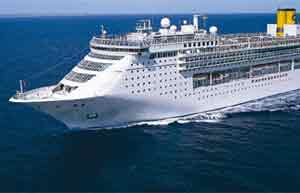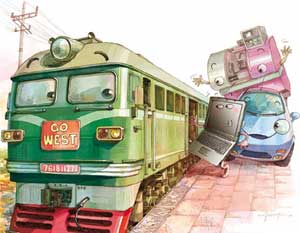EU leaders agree on framework to tackle debt woes
Updated: 2011-10-25 09:08
By Fu Jing and Zhang Chunyan (China Daily)
|
|||||||||
BRUSSELS / LONDON - European Union leaders agreed a five-element framework of a comprehensive strategy to root out fiscal and economic woes, the details of which will be announced after an evening summit on Wednesday.
The framework, agreed on Sunday after EU and eurozone leaders' summits, will promote growth and jobs with promises of substantial fiscal injections, though the majority of the 27 countries are deeply indebted.
Observers said European leaders' emphasis on jobs and growth can help pave the way for countries such as China to play a role in helping Europe stave off an economic crisis.
The leaders also agreed to mobilize new resources for Greece to make its fiscal funds sustainable, and build up a sufficient firewall against possible debt crisis contagion in Italy, Portugal and Spain. They also promised to design a coordinated scheme to recapitalize banks and improve their funding, and to take measures to ensure better governance and stronger integration of the euro area.
European Council President Herman Van Rompuy said: "These five elements are all interrelated. Both technically and politically they are part of one single package.
"Further work is still needed. That's why we will take the decisions at the follow-up euro summit," he added.
Admitting that fiscal margins are currently limited for most member states, Van Rompuy said the EU wants to combine measures that bring deficits under control with policies that cushion growth.
He said Europe's trade and investment relations with its international partners are another element of growth, and he said the leaders discussed how to use these relations more strategically.
"In this context, we also prepared the union's message to the G20 Summit at the beginning of November in Cannes, France," Van Rompuy said.
Professor Yao Shujie from the University of Nottingham in the United Kingdom said the major problems of the European economy that made its debt situation a major crisis are the extremely high levels of debt and the external nature of the debt, adding that many of Europe's debts are borrowed externally and foreigners will not tolerate the idea of not getting their money back.
Yao said it is a good idea for China to buy eurobonds. "If China invests in the bonds of a single country there is no guarantee of return," Yao said.
For example, if China buys Greek bonds and Greece defaults, all the money is lost. To dilute the risk, China can invest in European countries collectively through eurobonds.
Yao said China's role in the eurozone crisis is to bring confidence more than money. "Whatever China invests will be little compared to what is needed to rescue the eurozone countries.
"But if China helps Europe, then it shows the world that it believes Europe will recover," said Yao.
Christos Vlachos, director for the Greece-China Business Council, said the EU's message is very positive and that Chinese investors are welcome in Greece.
"They can take up low-risk projects, such as infrastructure, which are badly needed, and Chinese construction companies are especially welcome," Vlachos said in telephone interview.
Vlachos said many motorway projects in Greece have stopped because of a lack of financing.
"Chinese investors could step in, and Chinese investors can have a controlling role if they want to," said Vlachos.
However, the Chinese side has encountered some difficulties in investing in Europe.
"There have been two opposing forces in Europe's contact with China," Vice-Foreign Minister Fu Ying recently told journalists in Brussels.
First, some Europeans acknowledge China's economic and social progress, hoping that China would help Europe, but at the same time they point fingers very readily at China's political system and occasionally tend to politicize economic matters.
Second, some pin high expectations on greater trade and investment cooperation with China, but at the same time they show worries over Chinese investment, thus hurting the atmosphere of cooperation.
"Europe should get over the psychological hurdle, adapt to the new reality, retire stereotypes and accept a diversified world," Fu said on the website of China's mission to the EU.
"European countries should be more welcoming to investment from developing countries and actively help them, including investors from China, from which both sides stand to benefit."
Eveline Filon contributed to this story.











